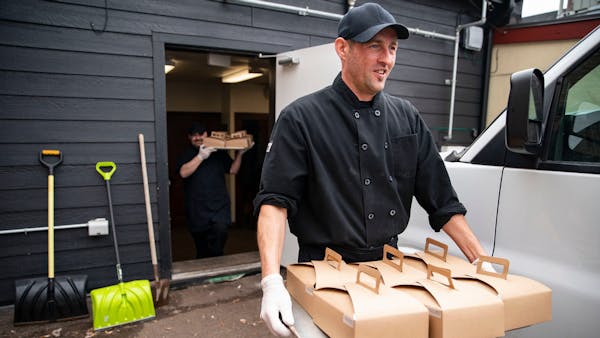The call comes suddenly, though he's half expecting it, and soon Kai Mayer is climbing into his '01 silver Sienna minivan and heading to the government district of Minneapolis. Downtown is oddly quiet — especially at rush hour on a Monday — as the 27-year-old cheerfully strolls into the lobby of the Hennepin County jail, where he's come to post bond for a stranger.
Mayer has been repeating this ritual a lot since the COVID-19 virus hit, sometimes five days a week. He works for the Minnesota Freedom Fund, a nonprofit that pays criminal and immigration bail bonds, mostly for inmates booked on low-level charges. The group's ultimate goal is to abolish what they call a "discriminatory, coercive and oppressive" system of cash-bail that disproportionately punishes low-income people.
Over the past couple of months, the mission of bail activists in America has become more urgent. As the pandemic spreads, many worry it will devastate the nation's jails, where hundreds of thousands are incarcerated in close quarters, and one infected inmate could spark a catastrophe.
"We know these facilities aren't equipped to deal with this," said Greg Lewin, board president of Freedom Fund. "It's so obvious that packing people into cages because they can't pay up is the opposite of flattening the curve. It's so obviously just an extra layer of immorality."
Since the virus hit the United States in late January, the Minnesota Freedom Fund has posted bail for 56 people in the Hennepin County jail and another six in ICE detention, according to data provided by the organization.
They say some they've bailed from the jail have been homeless or impoverished and accused of minor, nonviolent crimes — meaning they pose little threat to public safety, but are unable to afford even modest bail, some less than $100.
"All of our funds are going to be used up, because we're getting as many people out as possible," said Freedom Fund Executive Director Tonja Honsey. "We are on high-alert-crisis mode."
Time running out
The movement to reform America's bail system has gained mainstream traction over the past decade. New Jersey, Alaska and California are among states to limit or abolish conventional cash-bail, and similar efforts are underway in statehouses across the nation.
In 2016, Simon Cecil, then a graduate student at the University of Minnesota, started Freedom Fund with $10,000 in grant funding. The nonprofit has now posted more than 500 bonds, said Mayer.
Since the virus hit, Honsey and others from Freedom Fund worry time is running out for Minnesota, as it has in places like Chicago and New York, where inmates have already been diagnosed with COVID-19. If the virus does hit the jails here, she predicted, "it's going to spread quicker than anybody can do anything about."
As part of the response to the virus, Freedom Fund has lifted its $1,000 cap to pay for higher-dollar bails. It's also asked volunteers to call sheriffs, city and county attorneys and Gov. Tim Walz and pressure them to release more inmates.
At the same time, more than 30 prosecutors from across the country, including Ramsey County's John Choi, have signed a letter calling for the release of jail inmates who don't pose a public safety threat and are being held only because they can't afford cash bail. The letter also asks for the release of elderly or vulnerable people, and for federal authorities to dramatically reduce ICE detention. The Minnesota State Public Defenders Office and groups like the ACLU have also joined the chorus calling for more to be released from jail.
On Monday, Ramsey County Chief Judge John Guthmann announced the release of nonviolent and medically vulnerable inmates to home monitoring. Hennepin County Chief Judge Ivy Bernhardson issued an order last week allowing for the release of 18 people from the county workhouse. Hennepin County Attorney Mike Freeman cut the jail population by 26%, from 815 inmates on March 16 to 602 on March 19.
The leadership from the Freedom Fund say none of this is enough.
In Hennepin County, Lewin said, staff members are still posting bail for the elderly and people booked on nonviolent misdemeanor charges.
They've also continued to see bails set at $78, the exact amount of the surcharge for court fees in Hennepin County, he said.
"What they're saying, essentially, is these people's lives do not matter," said Honsey. "If they contract this virus and don't have the health care they should, they're going to die. And that's what's happening, and that's what's continuing to happen if they don't release people."
Andy Mannix • 612-673-4036

Want to share info with the Star Tribune? How to do it securely

'Safe recovery sites' would offer syringes, naloxone and more to people using drugs. The plan could be in peril.
New Minnesota GOP leaders seek peace with party's anti-establishment wing

Who is Republican Lisa Demuth, Minnesota's first House speaker of color?

